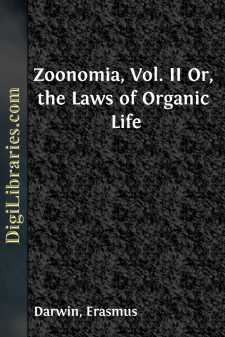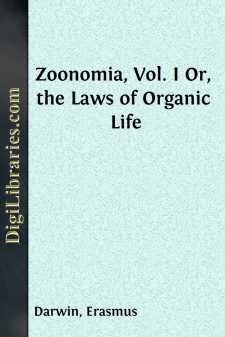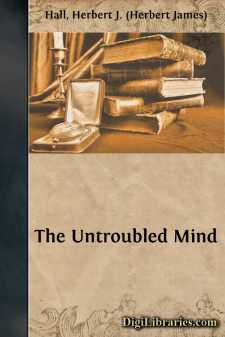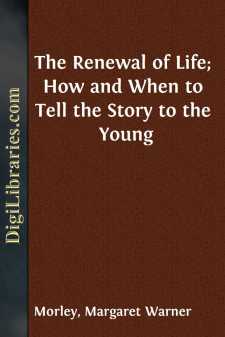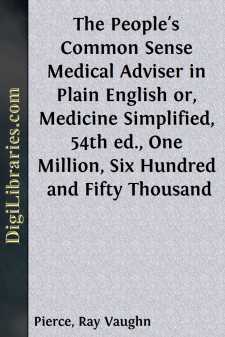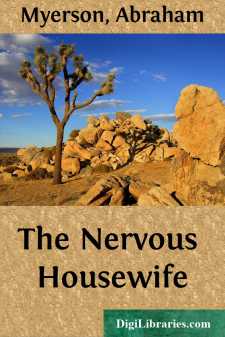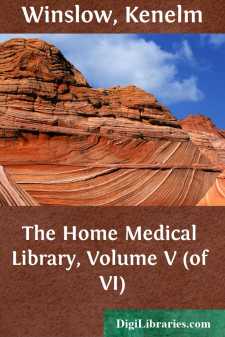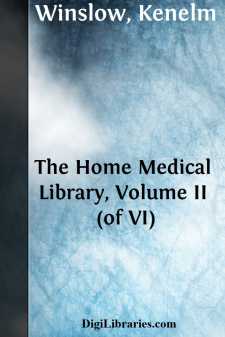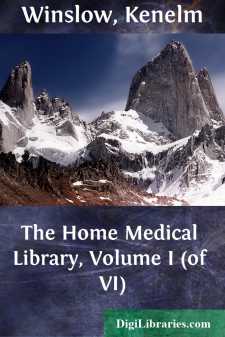Medical
- Anatomy 1
- Diagnosis 1
- General 14
- History 3
- Mental Health 6
- Osteopathy 1
- Pharmacy 2
- Physician & Patient 1
- Physicians 1
- Physiology 10
- Veterinary Medicine 1
Medical Books
Sort by:
by:
Erasmus Darwin
PREFACE. All diseases originate in the exuberance, deficiency, or retrograde action, of the faculties of the sensorium, as their proximate cause; and consist in the disordered motions of the fibres of the body, as the proximate effect of the exertions of those disordered faculties. The sensorium possesses four distinct powers, or faculties, which are occasionally exerted, and produce all the motions of...
more...
by:
Erasmus Darwin
SECT. I. OF MOTION. The whole of nature may be supposed to consist of two essences or substances; one of which may be termed spirit, and the other matter. The former of these possesses the power to commence or produce motion, and the latter to receive and communicate it. So that motion, considered as a cause, immediately precedes every effect; and, considered as an effect, it immediately succeeds every...
more...
Canst thou not minister to a mind diseas’d,Pluck from the memory a rooted sorrow,Raze out the written troubles of the brain,And with some sweet oblivious antidoteCleanse the stuff’d bosom of that perilous stuffWhich weighs upon the heart? Macbeth. When a man tells me he never worries, I am inclined to think that he is either deceiving himself or trying to deceive me. The great roots of worry are...
more...
THE RENEWAL OF LIFE Every human being must sooner or later know the facts concerning the origin of his life on the earth. One of the most puzzling questions is how and when such information should be given to the young. There is nothing the parent more desires than that his child should have a high ideal in regard to the sex-life and that he should live in accordance with that ideal, yet nowhere is...
more...
CHAPTER I. BIOLOGY. In this chapter we propose to consider Life in its primitive manifestations. Biology is the science of living bodies, or the science of life. Every organ of a living body has a function to perform, and Physiology treats of these functions. Function means the peculiar action of some particular organ or part. There can be no vital action without change, and no change without organs....
more...
by:
Abraham Myerson
CHAPTER I Introductory How old is the problem of the Nervous Housewife? Did the semi-mythical Cave Man (who is perhaps only a pseudo-scientific creation) on his return from a prehistoric hunt find his leafy spouse all in tears over her staglocythic house-cleaning, or the conduct of the youngest cave child? Did she complain of her back, did she have a headache every time they disagreed, did she fuss and...
more...
by:
Kenelm Winslow
The character and scope of this volume render it a most useful book for the home maker. The question of sanitation is one that closely affects the life of each individual, and many of its aspects are treated here in a lucid and comprehensive manner. Designed for wide distribution, these articles have been written to meet the needs of the dweller in the more densely populated communities, as well as...
more...
by:
Kenelm Winslow
CHAPTER I Injuries to the Eye—Inflammatory Conditions—"Pink Eye"—Nearsightedness and Farsightedness—Deafness—Remedies for Earache. —Foreign bodies are most frequently lodged on the under surface of the upper lid, although the surface of the eyeball and the inner aspect of the lower lid should also be carefully inspected. A drop of a two-per-cent solution of cocaine will render...
more...
by:
Kenelm Winslow
Preface Medicine, as the art of preserving and restoring health, is the rightful office of the great army of earnest and qualified American physicians. But their utmost sincerity and science are hampered by trying restrictions with three great classes of people: those on whom the family physician cannot call every day; those on whom he cannot call in time; and those on whom he cannot call at all. To...
more...


